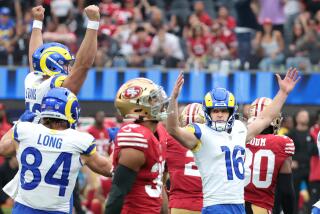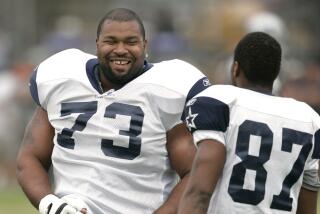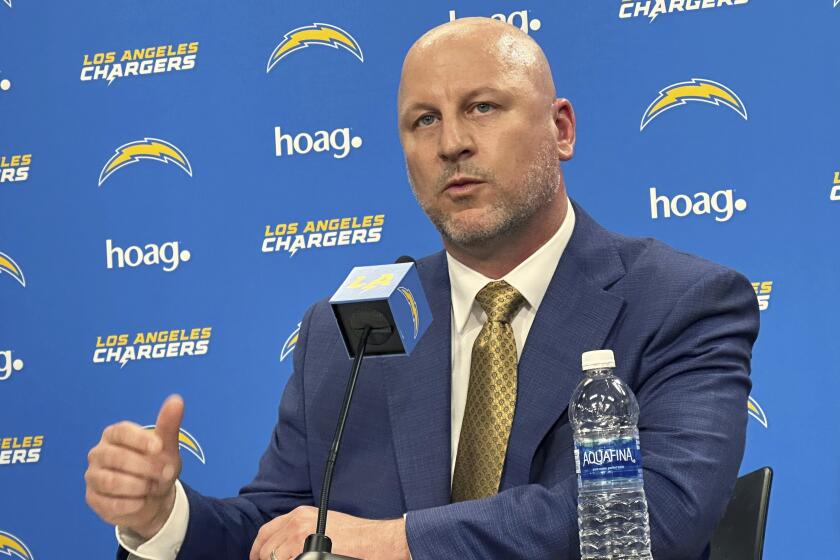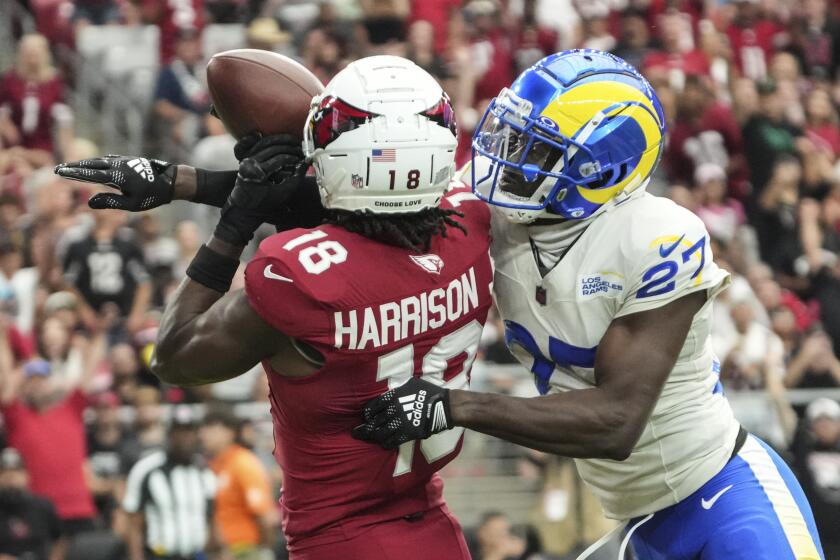George Allen, Coach Who Built Winners, Dies at 72 : Football: Motivator of troubled teams led Rams, Redskins and Cal State Long Beach to victorious seasons.
George Allen, the steely personification of the victory-obsessed football coach, who motivated underachieving Los Angeles Rams and over-the-hill Washington Redskins teams into perennial powerhouses and came back this year to post one last winning season as coach of the Cal State Long Beach 49ers, died Monday.
Allen, a physical fitness buff who never fulfilled his elusive dream of building a national fitness academy, died of natural causes at his Palos Verdes Estates home. He was 72.
The man who coached for six decades had been complaining of a cold, said Perry Moore, a former athletic director at Cal State Long Beach. Allen telephoned Moore about 11:30 Monday morning and they talked for about 20 minutes.
“He was hoarse and he said he had a cold and didn’t feel good,” Moore said. “We talked about football and he said he thought he could get a couple of good kids (recruits) for next year’s team.”
Another report, confirmed by a university official, suggested that a giddy locker-room celebration after the college team’s season-ending victory against the University of Nevada, Las Vegas, might have contributed to Allen’s recent poor health. The coach was doused with ice water by his ecstatic players and ever since had not been feeling well, said Becca Wohlt, a university spokeswoman.
At a dinner Sunday night, Allen told Frank Bowman, the university housing director, that “he had gotten a cold on Saturday, because he didn’t wear a jacket at the CSULB practice field when he watched Iowa’s team practice for the Rose Bowl. I said, ‘Stick with the Vitamin C and cold water.’ ”
Rams Coach John Robinson on Monday hailed Allen’s season with the ragtag Long Beach team as “his finest. He was able to continue what he loved to do right until the end--which was something to be admired. He was obviously one of the great coaches.”
Rams radio analyst Jack Youngblood, a former All Pro defensive lineman who came to the Rams in 1971, one year after Allen left for the first time, then played for him when Allen coached the Rams for two preseason games in 1978, said: “It’s a tragedy to lose someone so suddenly and unexpectedly like George Allen. It saddens your heart. He was a winner. He loved the game. He ate, breathed and slept football.”
Indeed, the coach was known as workaholic, who once explained why he enjoyed eating ice cream by saying it took little time to chew.
George Allen was known as a tight-mouthed disciplinarian who delivered peppy, almost arcane inspirational slogans to egg on the aging, beefy veterans who played for him so well.
Allen was a Puritan in a world of hell-raisers, who in his 70s still grimaced at obscenities, despite having spent a lifetime coaching his share of sometimes unstable, foul-mouthed “hit men.”
Even in his last year of coaching at Long Beach, Allen was visibly uneasy about players who wore earrings. He warned his college charges that “we don’t sit on helmets. We don’t litter. We don’t report late for practice and meetings. We don’t let our jerseys hang out. . . . We don’t walk. We jog.”
Allen was former President Richard Nixon’s favorite professional football coach. More than once, when Nixon was President, he called the coach before a crucial game to offer him a play or two.
“Theirs was a legendary relationship,” said Kevin Cartwright, an official at the Nixon Library in Yorba Linda.
Among NFL coaches, Allen was rivaled only by Miami’s Don Shula in his winning consistency, achieving a 118-54 record as a head coach. Allen was the most victorious Rams coach, posting a 49-17-4 record over five years--a .742 percentage. With the Redskins, he achieved a 67-30-1 record, a .691 percentage that topped even his predecessor, Vince Lombardi.
Chairman of the President Reagan’s Council on Physical Fitness in 1981, Allen also spent 1983-84 coaching in the now-defunct United States Football League with the Chicago Fire and Arizona Wranglers.
His teams won or challenged for the lead of their divisions repeatedly. But Allen, who was named NFL Coach of Year four times, never wore a Super Bowl ring. His 1972 Redskins team, with its wheezing roster of “Over-the-Hill-Gang” veterans such as Billy Kilmer, Sonny Jurgensen and Maxie Baughan, made it to the Super Bowl, but lost to the Miami Dolphins, 14-7 in the Los Angeles Coliseum.
Criticized for trading away prized draft choices for the older players he preferred around him, Allen replied: “The future is now.”
His teams--especially the creaking, eternally bruised Redskins of the early 1970s--gained a reputation for substituting guile and grace under pressure for the stamina and raw talent of younger players. In one hard-fought game with the Philadelphia Eagles, the wily Redskins won by simply trudging back to the line of scrimmage slowly--depriving their enraged opponents of the opportunity to kick a game-winning field goal.
“His basic philosophy was us against them,” said Richie Petitbon, a former Chicago Bears, Rams and Redskins’ defensive star and a longtime Allen aide. “He made enemies of everyone--the media, other teams--and it was effective. He was a great motivator. The players loved him.”
His final years in the NFL became increasingly controversial. In his zeal to find new veterans to replace those who were finally battered into retirement, Allen came under criticism for overspending his team budgets.
The late Edward Bennett Williams, who as president of the Redskins hired Allen, remarked shortly after the coach’s arrival: “When Coach Allen came to Washington, we agreed he had an unlimited budget. He’s already exceeded it.”
Originally a physical education major and later a junior varsity wrestling coach at the University of Michigan, Allen began his career as a head football coach in 1948 at Morningside College in Sioux City, Iowa. In his first year, the team had a 3-6 record--one of only three losing seasons he ever had as a head coach.
The other two losing seasons came in 1951 and 1954 at Nixon’s alma mater, Whittier College.
In 1957, Allen became receiver coach for the Rams--the first of an on-again, off-again spate of 12 seasons he spent with the team. He left a year later for the Bears, where he rose to prominence as one of the NFL’s top defensive coordinators.
Allen first took over the struggling Rams in 1966, guiding the team to an 8-6 record, their first winning season in eight years. The following year, the Rams finished first in their division with an 11-1-2 record, Allen’s best single-season mark.
His Rams were a defensive powerhouse, boasting an impregnable front line of behemoths known as the “Fearsome Foursome”--Deacon Jones, Merlin Olsen, Lamar Lundy and Roosevelt Grier. Quarterbacked by Roman Gabriel, the Rams practiced until they dropped--the result of Allen’s obsession with “preparation.”
Despite his starched presence, Allen’s players were unabashedly loyal.
“Coach Allen always thrived on building something out of very little,” said Houston Oilers coach Jack Pardee, who played under Allen as a linebacker with the Rams and Redskins.
He got along less famously with owners. Rams general manager Dan Reeves fired Allen in December, 1968, citing personality conflicts.
The team rebelled, demanding Allen’s reinstatement, and stunningly, a month later, he was brought back. Despite two more winning seasons, the conflicts remained, and Allen went to work in Washington.
There, Allen took his already-growing emphasis on experience-over-youth and turned it into a philosophy. Each year, he traded off draft choices to pick up veterans such as Kilmer and six former Rams, whose acquisitions led to the team nickname “Ramskins.”
“He was a great motivator,” said former quarterback Kilmer, who was a backup at San Francisco before becoming a star under Allen. “All of his desire was toward winning. He knew that as players, if you won, everything else fell into place. He taught you how to be a winner, not only on the field but off the field.”
In Washington, a city deserted by the baseball Senators and where memories of the last Redskins championship had long faded, Allen’s 1970s teams were beloved not only by average fans, but by national politicians who yearned to be invited to owner Williams’ box seats each Sunday.
Nixon, whose obsession with secrecy was mirrored by Allen’s own legendary efforts to eject spies from training camps, became an inveterate backer and a close family friend.
Last year, when the Nixon Library and Birthplace opened in Orange County, Allen was on hand as a guest of the family.
“They were great friends and Coach Allen was a wonderful friend of the Nixon family,” said library spokesman Cartwright.
Allen was fired by the Redskins after the 1977 season and landed back in Los Angeles. But the Rams’ then-owner, Carroll Rosenbloom, fired him just two games into the 1978 exhibition schedule.
There were rumors at the time that some members of the younger Rams team did not eagerly embrace Allen’s ways, including his complicated playbook, and rebelled.
Allen himself claimed that he was undercut by veteran Rams employees who made up strange things about him to tell Rosenbloom.
Appointed by President Reagan to the President’s Commission on Fitness, Allen later tried to build a national fitness academy on a 175-acre site in Laguna Hills. But after raising $2.7 million in funds, the academy never got off the ground.
He stunned local sports enthusiasts when he decided last December to coach the Long Beach 49ers, a team that had stumbled through losing seasons for years. He had not been a college coach since 1956. When Allen took the field with his team last fall, the coach himself acknowledged the obstacles against even posting a winning record.
But he gritted his teeth and--as he always had done--thought, or at least spoke, positively.
“I think I know what’s right and how to do it, and work hard,” he said last spring. “I expect everyone to be loyal and give 110%. That’s eccentric to some people.”
Still a fitness fanatic, Allen ran wind sprints with his team. Working 18-hour days, seven days a week--a pace that mirrored his practice-makes-perfect days with the Rams and Redskins--he was the same stickler for preparation he had always been.
After all the preparation and all the hoary sayings (“Be positive--no matter what happens!”), his team finished the season with more wins than losses.
And, as was his habit after a game well played, he went out and had ice cream.
He is survived by his wife Etty, a daughter and three sons.
Times staff writers Dick Wagner and Tim Kawakami contributed to this story.
More to Read
Go beyond the scoreboard
Get the latest on L.A.'s teams in the daily Sports Report newsletter.
You may occasionally receive promotional content from the Los Angeles Times.










